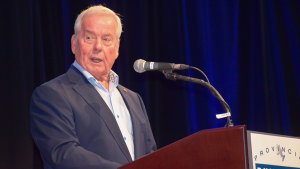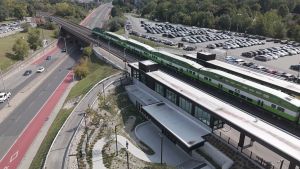The next generation of labour and management stakeholders in the unionized construction sector will soon have access to a new labour relations course that aims to train them on the fundamentals of collective agreements in the ICI sector.
The Ontario ░Ą═°Į¹Ū°ion Secretariat (OCS) is partnering with ░Ą═°Į¹Ū°ionlab to develop and deliver the course, coined ░Ą═°Į¹Ū°ion Labour Relations Fundamentals.
ŌĆ£We felt that there was a lot of knowledge that was potentially going to be lost through retirements, so we felt we needed a formal course,ŌĆØ Robert Bronk, OCS CEO, told the Daily Commercial News.
ŌĆ£We wanted to have a bar for labour and management so everybody is operating on the same page; the same understanding of what collective agreements say and what they donŌĆÖt say; processes for mediation and arbitration; types of negotiations, just to raise the general awareness of the industry.ŌĆØ
The process started two years ago but with COVID it was difficult to do in-person meetings, Bronk said.
ŌĆ£We saw that there was really nothing out there that was specific for the construction industry and even more specifically for the ICI sector,ŌĆØ he noted.
░Ą═°Į¹Ū°ionlab Ltd. was awarded the contract to develop the course design following a request for proposals process.
The course is geared to anybody associated with employer or employee bargaining representatives and those in the bargaining room negotiating collective agreements. The goal is to deliver the first course this November.
The three-day, 21-hour course will likely be held in person with the possibility of a virtual component.
ŌĆ£The purpose of this really is to make sure that in off bargaining years that labour and management are coming together to collaborate and spend some time shaking hands and meeting and greeting everybody,ŌĆØ said Derek Smith, the project lead for ░Ą═°Į¹Ū°ionlab. ŌĆ£That has to be done in-person.ŌĆØ
The broad themes for the course were developed with the help of Reg Pearson, former OCS board member and former associate deputy minister for the Centre for Public Sector Labour Relations and Compensation.
ŌĆ£We worked with him to get the first iteration, the broad chapters and topics and to get the bones of what the course is going to look like and what are some of the major teaching objectives,ŌĆØ Bronk explained.
ŌĆ£Last November, we had a pilot run. We invited 20 stakeholders and gave the first dry run. We got a lot of feedback from everybody.
ŌĆ£We put together that package and then we put out an RFP.ŌĆØ
The course will include eight themes: historical context of construction labour relations; what the current legislation framework is; understanding collective agreements; collective bargaining process and negotiations; grievances and jurisdictional disputes; occupational health and safety; human rights in a context of collective agreements; and labour and management collaborative partnerships.
While all aspects are important, Smith says historical perspective is key.
ŌĆ£WeŌĆÖve got a lot of new people coming into labour relations. There is a generation that is leavingŌĆ”and there is a lot of new young management that are maybe from other backgrounds,ŌĆØ he said.
ŌĆ£The other piece to it, which is really huge, is negotiating skills. YouŌĆÖre sitting in a room bargaining a collective agreement, somebodyŌĆÖs future, the next three years of their income and you may not have negotiating skills.ŌĆØ
Bronk expects there will be quite a bit of demand for the course. He also hopes it will give people a better understanding of grievances and jurisdictional disputes.
ŌĆ£When people understand the process better there may be opportunities to go a less formal route than to go all the way to the labour board in terms of dispute resolution,ŌĆØ said Bronk.
ŌĆ£If everybody understands the processes better we can come to dispute resolutions quicker and faster and thatŌĆÖs better for everybody.ŌĆØ
Over the next few months, Smith will be finalizing the course material. While he is the prime facilitator for the course, he is planning to have guest facilitators as well.
Smith is also designing the breakout group and interactive exercises to maximize engagement of participants and is also putting together a resource handbook.
ŌĆ£One of the key aspects of the overall project is to ensure that as the course is being developed, it is being tested by those who are at the bargaining table and on the ground involved in local work area practices, grievance procedures and finding solutions to better OntarioŌĆÖs existing industrial, commercial and institutional construction collective agreements,ŌĆØ he said.ŌĆØ
ŌĆ£We have established an internal review team to do just that.ŌĆØ
Follow the author on Twitter .







Recent Comments
comments for this post are closed